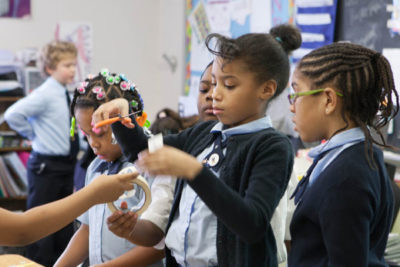My sister asked me why teachers objected to charter schools. Why shouldn’t the money just follow the kids to whatever school the parents choose?
I said that back in the 1970s, when I first started teaching, my first couple of jobs were in little Christian schools. We got paid about a third of what public school teachers made. Almost no benefits. I remember being handed a ream of paper before school started—that was my supply of copy paper for my class for the year. We had no specialists and no support staff.
At that time the parents sometimes talked about how frustrating it was that they paid taxes for public schools and then paid tuition for private school. Why couldn’t they have their own tax money to pay for their tuition?
My sister said, “Exactly.”
I told her the voucher movement started with already existing private schools. Even with that small beginning, the public schools were highly suspicious. I remember a great story from New York City where the public school union reps confronted the Catholic school nuns, accusing them of wanting to take only the best and the brightest of the students and turning away the trouble makers. The nuns said, “You pick who you send to our schools. We’ll take whoever you send.” That shut up the union, as far as those schools were concerned.
The ironic thing was, most of the private religious schools that I knew about quickly turned away from the voucher movement. They decided that money from the government in any form—even in the form of vouchers—would come with government strings attached. And they wanted to preserve their autonomy.
However, the voucher movement continued. Individuals, institutions, organizations—people created charter schools specifically to take advantage of voucher programs. And some charter schools are businesses, designed to make a profit.
I told my sister, I have a hard time reconciling the idea of taking money from public schools to give to private schools that are for-profit institutions.
She said, “Well, that’s ridiculous. That would be wrong.”
On the other hand, I’d like my coworkers who damn all charters with the same brush to take a look at Breakthrough Schools in Cleveland. Breakthrough Schools are a network of charter schools in Cleveland.
- They are NONPROFIT.
- They target some of the city’s neediest areas.
- And they are remarkably successful.
“Nearly all Breakthrough students are students of color, and eight of 10 are low-income.”
“Its schools are in the top third of all schools in the city for academic performance.”

And by the way, Breakthrough Charter Schools joined 20 other high scoring charter schools in opposing President Trump’s education budget, even though the new budget proposes $168 million more for charter schools. They united to oppose the cuts to traditional public schools, saying,
“We need federal support for all schools, for all kids, not just kids in ‘choice’ schools.”
“Budgets are statements of priorities, and this one sends a clear message that public education is not a top priority.”
The group specifically objected to cuts in Pell grants, teacher training, and afterschool programs.
And they reiterated the value of public education as an “essential pillar of our democracy.”
Personally, I can’t reduce the charter school debate to a sound bite. I think for-profit schools should operate with no public money at all. But as far as I am concerned, if Cleveland or Ohio wants to give vouchers to families with children attending Breakthrough Schools, I’d be fine with that. Breakthrough Schools are bringing new people, new energy, and new ideas to a place that desperately needs them—not to make money, but to make a difference.
I’ve had similar conversations with friends of mine not in the education field. Why is “choice” a bad thing? they wonder. Why are charters and vouchers bad? As you point out, the reductionist “good v. bad” painting of the issue oversimplifies what is a mind-bogglingly complex matter.
For me it, always comes down to these:
1. If we believe that a good public education is the right of every child in this country, we need to create (FUND) a system that doesn’t require choice… there should be no bad choices.
2. If there is something that charters are permitted to do that traditional public schools are somehow not permitted to do, we need to consider the regulations we put on traditional schools while also considering the sustainability of the charter model.
3. The parent’s economic, social, or cultural situation should not become the impediment to the child’s opportunity… and well-funded, well-supported public schools are the potential equalizer.
Sadly, I don’t believe that our country (neither policymakers nor the public) any longer believe in the importance of raising us all up in order to raise ourselves individually. When the future of a five-year-old can be dictated by whether a parent chooses well or leaves them to face an unsatisfactory “default” option… I can’t even finish that sentence…
Great, balanced post, Jan. I spent a week in NYC touring various charter schools and some of them were very good. They were, however, completely unsustainable from a teacher’s point of view. Those people put in horrendous hours with absolutely no job security. Consequently, they had enormous attrition rates.
Something else to consider.